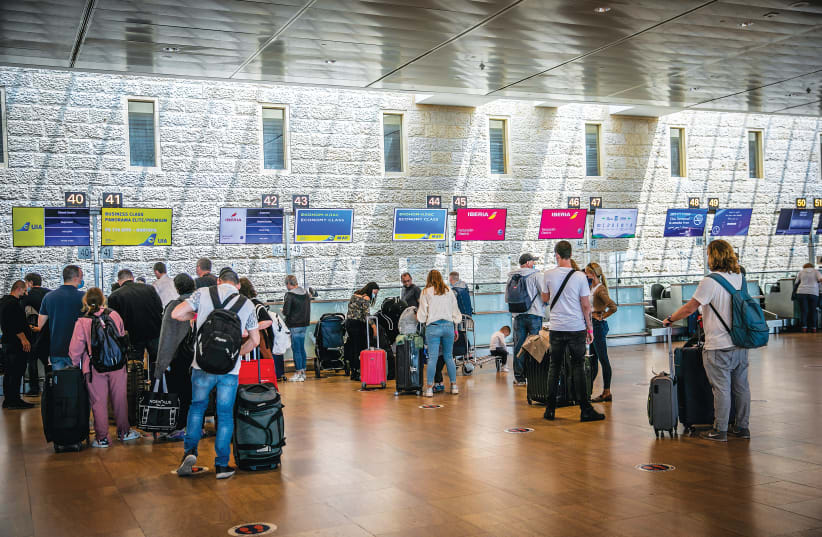Vaccinated foreign tourists are not going to be allowed into Israel before August 1, Prime Minister Naftali Bennett’s government decided Wednesday, as Israel faces an increase in coronavirus cases.
In addition, the obligation to wear masks indoors will be restored if the average daily cases will exceed 100 for a week.
“Our goal at the moment, first and foremost, is to protect the citizens of Israel from the Delta variant which is raging in the world,” Bennett said. “At the same time, we want to reduce as much as possible the disruption to daily life in the country. Therefore, we decided to act as early as possible – right now – so as not to pay a heavier price later on, by taking responsible and quick actions.
“It is up to us,” he said. “If we adhere to the rules and act responsibly, we will succeed together.”
Vaccinated tourists were originally supposed to be allowed into the country starting on July 1. In recent days, the country has been hit by the Delta variant, causing an increase in infections in cities such as Modi’in and Binyamina. At the moment, some 250 students and 50 teachers in Israel have tested positive for the virus.
“I’m not surprised by this outcome, but I’m disappointed because I felt that Israel was untouchable when it came to COVID, and I thought the opening would be on time,” tourist Jamie Hayeem said.
“I’m so sad. I had been looking forward to it, but I’m glad that the country is taking necessary precautions to stay safe,” said Gaby Danziger, another tourist.
There are currently some 554 active cases in the country. The number had recently dropped to less than 200. At its record last winter, the figure stood at over 85,000.
Following the current outbreaks and the new recommendation by the authorities to vaccinate all children ages 12-15, over 7,000 shots were administered on Tuesday, the highest in over a month. Some 4,000 of them were first doses to children, about double the amount of previous days.
To tackle the new outbreak, the government decided to establish a new coronavirus cabinet including Bennett, Health Minister Nitzan Horowitz, Foreign Minister Yair Lapid, Defense Minister Benny Gantz, Finance Minister Avigdor Liberman, Justice Minister Gideon Sa’ar and Interior Minister Ayelet Shaked, as well as other ministers.
Earlier in the day, the Health Ministry announced that in specific situations, vaccinated or recovered individuals may be ordered to enter quarantine.
According to current regulations, people who are considered fully immunized (a week after their second shot or after they recovered from the disease) are exempt from isolating if they come in contact with an identified virus carrier.
However, according to a new directive signed by the ministry’s director-general Chezy Levy, the director-general, a district physician, or the head of Public Health Services will be able to demand that these individuals isolate if they were in contact with someone infected with a variant of the virus that is considered especially dangerous or with an event with an exceptionally serious morbidity effect. They also might need to isolate if they are regularly in contact with a population at high risk or not vaccinated, or if they flew on the same plane with an identified coronavirus carrier.
In addition, the new directive restores the obligation to wear a mask at the airport and in medical facilities.
Finally, Horowitz said that parents or those responsible for a minor under the age of 12 who is required to be quarantined can receive a fine of NIS 5,000 if the minor does not comply with the rules. As Horowitz explained to the Knesset plenum, children above the age of 12 will be fined directly.
The minister also assured that the logistical issues at Ben-Gurion Airport’s testing complex – which on Friday caused some 2,800 incoming passengers to go home without getting tested, as is required for all those who land in Israel – have been solved, and that the enforcement of travel regulations is in the process of being stepped up.
Israelis who fly to countries under the travel ban – at the moment Argentina, Brazil, India, Russia and South Africa – without obtaining permission from the special governmental committee devoted to this purpose, will now be fined.
On Tuesday, Israel registered some 111 new coronavirus cases – a slight decrease from the previous day’s 125, but still a high number compared to previous weeks. As of 5 p.m. on Wednesday, 101 new cases had already been identified.
The last time the country had over 100 new virus carriers per day was in April.
However, the figures remain very low compared to the thousands of new patients that emerged every day at the peak of the pandemic – and the current cases are asymptomatic or at most mild.
“We cannot say whether the outbreak is under control,” Coronavirus Commissioner Prof. Nachman Ash said during a press conference he held about the situation with Levy and Public Health Services Director Dr. Sharon Alroy-Price.
During the briefing, Levy explained that they decided to postpone the entrance of vaccinated tourists for a month in light of the increase in new cases, and said that vaccinated foreign nationals will be allowed into Israel from August 1 – provided that nothing unexpected happens and no further surge occurs.
Out of the 110 new cases registered on Tuesday, 14 people came from abroad, and nine of them were fully vaccinated, according to the Health Ministry.
Nell Schwartz contributed to this report.
